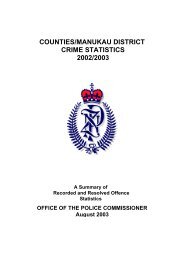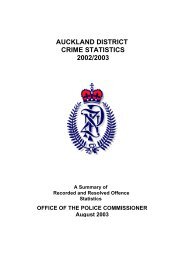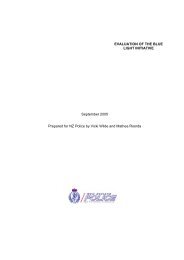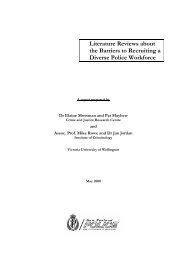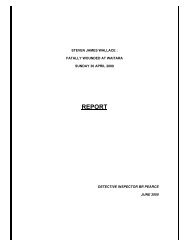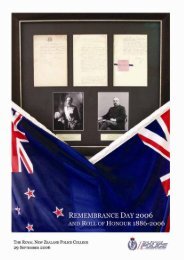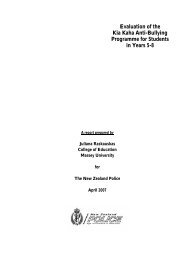Police Perceptions of Maori - Rethinking Crime and Punishment
Police Perceptions of Maori - Rethinking Crime and Punishment
Police Perceptions of Maori - Rethinking Crime and Punishment
Create successful ePaper yourself
Turn your PDF publications into a flip-book with our unique Google optimized e-Paper software.
<strong>Police</strong> attitudes <strong>and</strong> behaviour in general<br />
<strong>Police</strong> responses to differences in ethnicity<br />
When asked 'Do police <strong>of</strong>ficers generally respond the same way to <strong>of</strong>fenders who<br />
belong to different ethnic groups?', 72% said that they did. A minority <strong>of</strong> 19% said<br />
that responses were sometimes different. Some comments indicated that <strong>of</strong>ficers were<br />
responsive to cultural difference in a constructive way:<br />
Each ethnic group requires a different way <strong>of</strong> speaking to or with a person.<br />
Language <strong>and</strong> cultural considerations are important. You wouldn't treat a<br />
<strong>Maori</strong> the same way as an Asian, as a European as a Pacific Isl<strong>and</strong>er.<br />
At other times, the differences were seen as stereotyping or discriminating against<br />
<strong>Maori</strong> <strong>and</strong> also sometimes other Polynesians:<br />
Many long serving Caucasian police <strong>of</strong>ficers have little time for juvenile<br />
<strong>Maori</strong>s, or Polynesians, they talk down to them.<br />
<strong>Police</strong> are racist <strong>and</strong> have no tolerance for lower class ethnic groups. They<br />
don't think they deserve to be treated like upper class <strong>of</strong>fenders.<br />
The darker races are all treated as second class citizens. The assumption <strong>of</strong><br />
guilt is worse for <strong>Maori</strong>.<br />
Some police <strong>of</strong>ficers speak to them differently - slower, pidgin English,<br />
arrogantly <strong>and</strong> use abusive language.<br />
There seems to be a stereotyped attitude. If one <strong>Maori</strong> <strong>of</strong>fends then all are<br />
considered to be judged that way -'typical <strong>Maori</strong>' or 'what are they claiming<br />
now?'.<br />
Ethnic groups are considered 'acting suspicious' if seen in same situation as<br />
'non ethnic persons'.<br />
Some <strong>of</strong> this stereotyping comes from the fact that a lot <strong>of</strong> the <strong>of</strong>fenders dealt with by<br />
police are <strong>Maori</strong> <strong>and</strong> this experience is generalised to all <strong>Maori</strong>:<br />
Because <strong>Maori</strong> are seen as the bulk <strong>of</strong> <strong>of</strong>fenders <strong>and</strong> perhaps the hardest to<br />
h<strong>and</strong>le police <strong>of</strong>ficers tend to treat them firmer.<br />
Because police deal with large numbers <strong>of</strong> <strong>Maori</strong> <strong>of</strong>fenders, they tend to<br />
stereotype all <strong>Maori</strong> as gang members <strong>and</strong> drunks prone to domestic violence.<br />
Other commentators gave explanations for different attitudes <strong>and</strong> behaviour that<br />
emphasise the interconnection <strong>of</strong> race, class <strong>and</strong> power:<br />
All are treated badly if they are seen as ‘white trash' or '<strong>Maori</strong> scum' or 'dumb<br />
isl<strong>and</strong>er' but they are treated differently if the police <strong>of</strong>ficer knows they are<br />
connected to a 'respectable' person in the community or are likely to complain<br />
about their treatment.<br />
11



